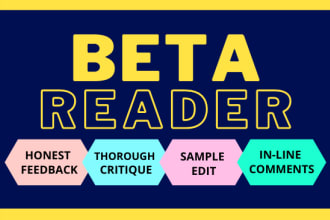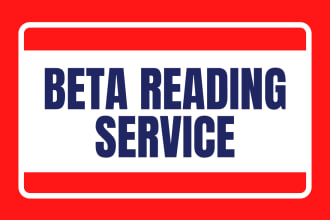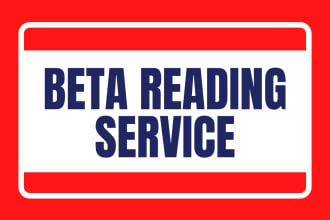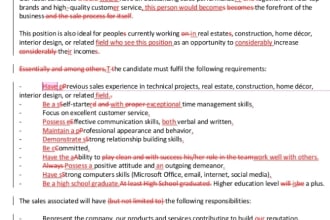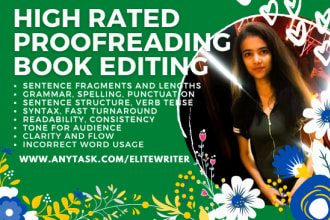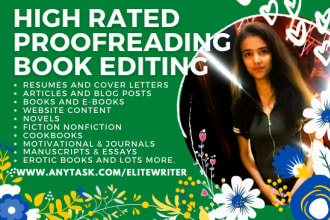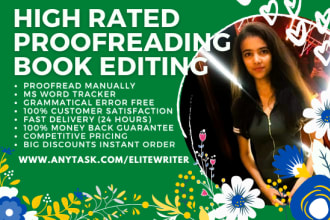Beta Reading
Beta readers help make your work better. Find one here at great value.
Finding the Best Beta Readers
Beta readers can help you put the finishing touches on your book. Hiring a professional beta reader also gives you a more honest, objective commentary on your book than if you ask friends and family to read it. When looking for beta reading services, find someone with some experience reviewing books and who can get the job done in a reasonable amount of time.
FAQs
What does a beta reader do?
A beta reader is someone who reads your book before it’s published. They’re like beta testers in software and product development, but specifically for books. The point of using beta readers is to get a perspective on your book manuscript from an “average” reader. When you hire a beta reader, they should provide advice, commentary, and opinions on your book. You don’t send your manuscript to beta readers until you’re done writing and making your own edits, and getting ready to publish the book.
How long should a beta reader take?
On average, it takes about 1 hour to read and process 10,000 words. If your manuscript has 80,000 words, tell your beta readers they have 8 hours of reading time. Remember, when you hire a paid beta reader, you’re asking them to both read and provide suggestions/comments, so it may take them slightly longer to get through the book than a passive reader would.
How many beta readers should I use?
You should have more than one beta reader. You can’t rely on the commentary, insights, and opinions of just one or two readers. To have a more balanced perspective on your manuscript, get several readers. Up to five beta readers is usually good, but it will depend on your book. If you hire enough beta readers, you may even be able to skip hiring a developmental editor, which saves on costs. Beta readers are less expensive than editors.
What’s the difference between editing and beta reading?
Editors and beta readers fill different roles in the writing, editing, and publishing process of a book. Editing books is a career, whereas beta reading is something most people do on the side. Editors have professional experience working with writers to make adjustments to a manuscript before it’s published. There are different types of editors, such as copyeditors, line editors, and developmental editors. The most involved of these three is the developmental editor, who makes structural or sweeping changes to a manuscript, whereas copyeditors and line editors focus on grammar and style, respectively.
Beta readers, on the other hand, tend not to be professionals, although they’re usually paid for beta reading. Beta readers may look for errors in spelling, punctuation, and grammar. They may also comment on any inconsistencies or provide their impressions of the manuscript. You can pay a beta reader for their work, but it’s also common to provide them with a free advance copy of the book as payment, and ask them to leave an honest online review.
When is a beta reader needed?
You need a beta reader after you’ve worked with your editor and before you’re about to publish your book. Why are they important? Beta reading lets you get initial feedback on your book before you release it to the general public. It helps you spot things you or your editor may have overlooked, or gives you a sense of how average readers will receive your book.
Why can’t you just ask friends and family to beta read your book for you? Readers for hire will be more objective about your book, and unafraid to provide honest comments. It’s also beneficial to recruit a beta reader who’s in your target demographic if possible.
How do I hire beta reading services?
Looking for freelance beta readers is usually your best bet for finding someone objective. Many beta readers advertise their services online so you can find them easily. When hiring a professional beta reader, look specifically at the services they’re providing. Do they include a thorough critique or just correct grammar and spelling? Also, ensure they can have your book read and produce their commentary within a reasonable time frame. Beta readers who promise to read an entire manuscript and produce a critique in a short time may not give you the high-quality feedback you’re looking for.

